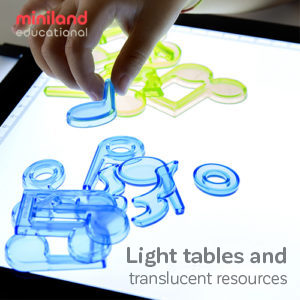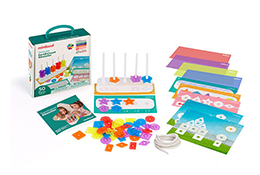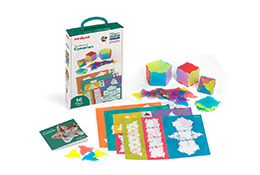As the back-to-school season approaches, early education teachers are preparing their classrooms to foster a nurturing and inclusive environment. One of the most impactful ways to support this goal is through inclusive play. Integrating inclusive play into your curriculum not only promotes social and emotional learning (SEL) but also lays a strong foundation for empathy, understanding, and acceptance from an early age.
The Importance of Inclusive Play in Early Education
Inclusive play involves activities and materials that reflect the diverse world we live in. It encourages children to appreciate differences and develop a sense of belonging. When children engage in inclusive play, they learn to value themselves and others, fostering an environment of respect and kindness.
Here are a few reasons why inclusive play is crucial:
- Promotes Empathy and Compassion: When children interact with toys and games that represent different cultures, abilities, and family structures, they begin to understand and appreciate diversity. This promotes empathy and helps them to see the world from different perspectives.
- Encourages Social Skills: Inclusive play helps children develop essential social skills such as cooperation, communication, and conflict resolution. These skills are fundamental for their overall development and future relationships.
- Enhances Emotional Intelligence: Understanding and expressing emotions is a critical aspect of SEL. Inclusive play provides opportunities for children to explore their own emotions and those of others, enhancing their emotional intelligence.
- Builds Self-Esteem: When children see themselves represented in the toys and games they play with, it boosts their self-esteem and sense of identity. It reassures them that they are valued and respected for who they are.
Implementing Inclusive Play with Miniland’s SEL Products
Miniland Educational offers a range of products that support SEL through inclusive play. These toys are designed to help children recognize and celebrate diversity, fostering an inclusive environment in your classroom. Here’s how you can implement inclusive play using Miniland’s SEL products:
- Emotiblocks: Introduce Emotiblocks during circle time to help children learn to identify and express different emotions. These versatile blocks come with interchangeable pieces that allow kids to create various facial expressions. You can use them in role-playing activities where children act out different scenarios, promoting emotional literacy and empathy.
- Emotions Puzzles: Set up a puzzle station with the Emotions Puzzles, encouraging children to match faces with corresponding emotions. This activity is a fun and interactive way to help young learners understand and articulate their feelings. You can also create group discussions around the completed puzzles to delve deeper into understanding various emotions.
- Inclusion Puzzles: Incorporate Inclusion Puzzles into your learning centers. These puzzles depict diverse scenarios, including children with different abilities and backgrounds. Use them to initiate conversations about inclusivity and acceptance, helping children appreciate and respect differences.

4. Family Diversity Blocks: During free play, provide Family Diversity Blocks to represent different family structures. Encourage children to build and share their own family models, promoting acceptance and understanding of diverse family dynamics. This activity can also be paired with storytime where children share stories about their families.
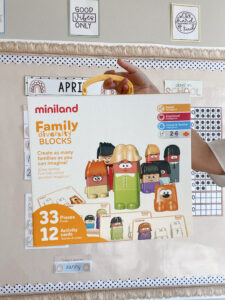
5. Job Blocks: Use Job Blocks during career day activities to introduce children to various professions. These blocks emphasize that anyone, regardless of their background, can achieve their dreams. Role-playing different jobs can help children understand the value of every profession and inspire them to dream big.

6. Wooden Wheelchair: Include the Wooden Wheelchair in your dramatic play area with Miniland dolls. This promotes awareness and acceptance of physical disabilities. Encourage children to play out scenarios where dolls with and without wheelchairs interact, helping them understand and respect the experiences of those with mobility challenges.
7. Grandparents Puzzle: Use the Grandparents Puzzles during family-themed activities. This puzzle set highlights the important role of grandparents in a child’s life, fostering respect and appreciation for the elderly. Invite children to share stories about their grandparents, building intergenerational connections and respect.
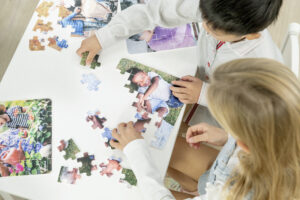
Practical Tips for Inclusive Play
Here are some additional tips for incorporating inclusive play into your back-to-school preparations:
- Diverse Toy Selection: Ensure that your classroom toys and materials represent a wide range of cultures, abilities, and family structures. Miniland’s SEL products are an excellent place to start.
- Storytelling and Role Play: Use storytelling and role play to discuss different emotions, cultures, and abilities. Encourage children to share their own stories and experiences.
- Inclusive Activities: Plan activities that promote collaboration and teamwork. This helps children learn to work together, respect each other’s differences, and build a sense of community.
- Positive Reinforcement: Recognize and celebrate acts of kindness, empathy, and inclusion in your classroom. Positive reinforcement encourages children to continue these behaviors.
Conclusion
As you gear up for the new school year, remember that inclusive play is a powerful tool for promoting SEL in early education. By integrating products like Miniland’s SEL mentioned above, you can create a classroom environment that values diversity, empathy, and inclusion. Let’s work together to build a brighter, more inclusive future for our children.

